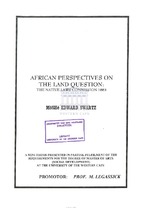| dc.description.abstract | Both Am-Xhosa and the European farmers, being pastoralists "the search for land and grass
was (their) first principle", notes Walker (1928). When they met, they differed
fundamentally on the "vital matter oflandholding" . So different were their perspectives, that
Lekhehla (1955) suggested, as far as the treaties were concerned: "The Native Chiefs either
did not understand the implications of the border treaties, or if they did, never intended to
respect such treaties" (p.2 1). Hopper (1980) says the tension between the Europeans and the
Africans on the land issue emanated from the fact that "Xhosa expansion" and "colonial
expansion" processes were entirely different. While Am-Xhosa expanded in order to
"preserve their political integrity" colonists were driven by an economic dynamic they
expanded because land was necessary to accommodate growth (1980:261). | en_US |

